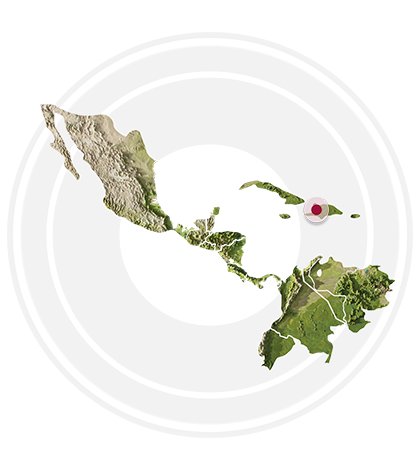Inside Mexico's Most Powerful Drug Cartel | Foreign Correspondent
Drug Mules.

Main points
Statistics are based on the year of death registration – because of death registration delays, around half of these deaths will have occurred in the previous year (2019), and the majority will have occurred before the coronavirus (COVID-19) pandemic in the UK.
- In 2020, 4,561 deaths related to drug poisoning were registered in England and Wales (equivalent to a rate of 79.5 deaths per million people); this is 3.8% higher than the number of deaths registered in 2019 (4,393 deaths; 76.7 deaths per million).
- Among males, there were 109.7 drug poisoning deaths registered per million in 2020 (3,108 registered deaths), compared with 49.8 deaths per million among females (1,453 deaths).
- Two-thirds (or 2,996) of registered drug poisoning deaths in 2020 were related to drug misuse, accounting for 52.3 deaths per million people.
- Rates of drug-misuse death continue to be elevated among those born in the 1970s, with the highest rate in those aged 45 to 49 years.
- The North East continues to have the highest rate of deaths relating to drug misuse (104.6 deaths per million people); London had the lowest rate (33.1 deaths per million people).
- Approximately half of all drug poisoning deaths registered in 2020 involved an opiate (49.6%; 2,263 deaths); 777 deaths involved cocaine, which is 9.7% more than 2019, and more than five times the amount recorded a decade ago (144 deaths in 2010).

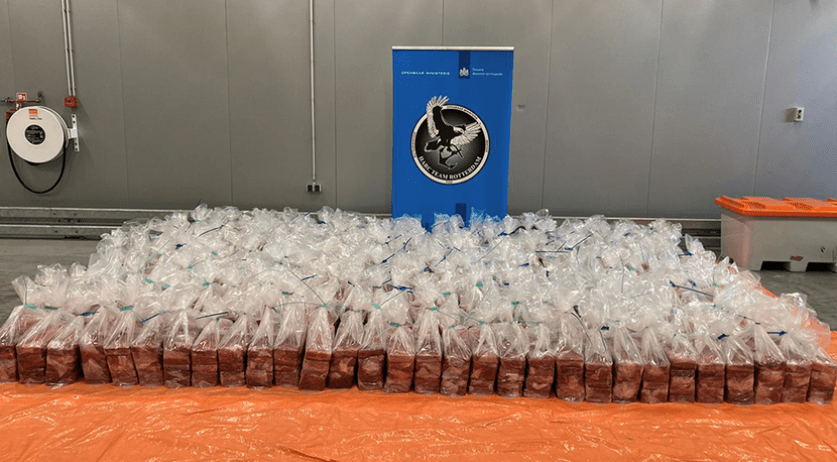
2,100 kilos of cocaine found in port of Rotterdam - Source: Openbaare Ministerie at Openbaare Ministerie
Sunday, August 15, 2021 - 12:00 PM
Tons of cocaine found in Rotterdam and Curaçao
Authorities in Rotterdam discovered 2,100 kilos of cocaine in banana pulp containers on Friday. That same day, the coast watch in Curaçao found over one thousand kilos of cocaine on a speedboat.
The drugs that were found in Rotterdam were discovered in a container from Costa Rica. The company to which the container was [addressed is] likely not involved in the drug. The over two tons of cocaine that were found have a street value of around 157 million euros, Public Prosecution Services stated. The drugs have since been destroyed.
In Curaçao, authorities detected the drugs after they received an alert of a speed boat near the coast which they suspected to be smuggling narcotics.
After the people on board the boat did not react to the directions of the coastal guard, authorities knocked out the engine of the speedboat with targeted shots. An interceptor vessel of the marine ship Zr.Ms. Holland was used to save the 12 people on board, as well as the sinking drug packets.
On the boat, there had been 1,050 kilos of cocaine and 275 kilos of marijuana. All 12 people on board the speed boat were taken into custody. One suspect was injured during the arrest. They were taken to hospital via helicopter.
The speedboat was used to smuggle drugs to the south of Curaçao.
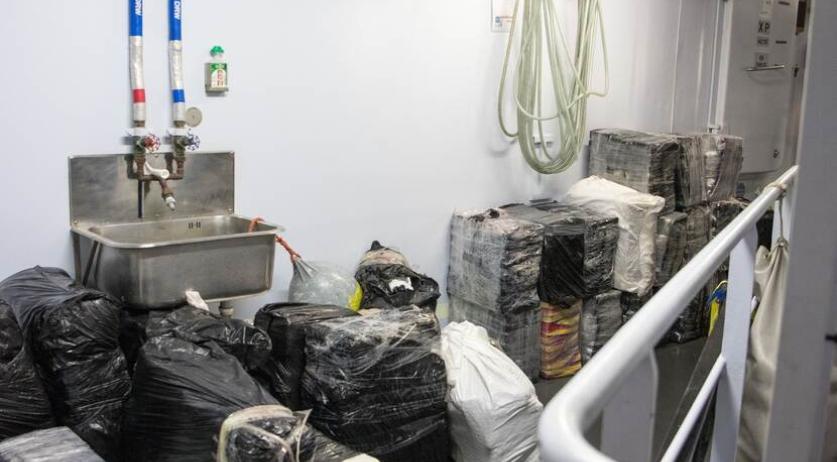
1,325 kilos of drugs found on speedboat in Curaçao - Source: Ministerie van Defensie at Ministerie van Defensie
Agents of the Spanish National Police, in a joint operation with the Civil Guard and the Tax Agency, have seized 1,100 kilograms of cocaine in a container that was in a warehouse in Valencia. The narcotic substance was hidden with a sophisticated concealment system in the ceiling and on the floor of the structure of the container itself. The shipment came from Manta, Guayaquil (Ecuador) and its final destination in Spain was Vigo (Pontevedra).
Important consignment of cocaine
The investigation began when the agents became aware of a criminal organization that was going to receive in Spain a significant consignment of cocaine from Manta, Guayaquil (Ecuador). The drug was going to enter the national territory through Valencia but its final destination was Vigo (Pontevedra).
As a result of several investigations, the agents confirmed that the container loaded with frozen food and, in addition, with the drug inside, had already reached the Port of Valencia. Once in our country, it was transported by truck to a company in Valencia, where it is unloaded and stored in a container area. With this information, the agents intervened the container and managed to extract the drug that was hidden in the structure of the container.
They used a Swedish moving company based in Alicante and Malaga to transport the drug from Spain to the Nordic country, hiding it among the legal charges that the company carried out
In Madrid, one of the most violent criminals was arrested, classified by EUROPOL as a high value target for his alleged involvement in crimes of conspiracy for murder, drug trafficking, kidnapping and extortion
A total of 1,700 kilograms of hashish, 500 kilograms of marijuana, 55,000 units of an opiate drug used as a substitute for heroin, 5 kilograms of cocaine, 23 kilograms of amphetamine, two submachine guns, one rifle, eight short weapons, one hand grenade, five air pistols and 400 cartridges
They have also been intercepted 592,000 euros in cash, 1,850,000 euros in bank accounts and bitcoin wallets with an estimated value of 15,000 euros; and properties valued at more than € 14,000,000 have been blocked
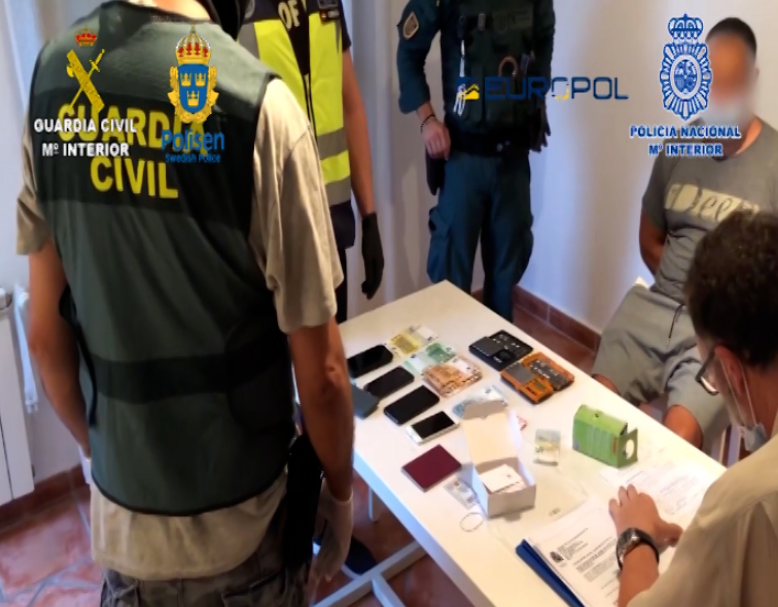
LOUISVILLE, Ky—U.S. Customs and Border Protection (CBP) officers in Louisville are seeing unfathomable increases in illicit and dangerous items arriving at the port of Louisville, with some seizures breaking previous records.
CBP officers around the nation are stationed at Express Consignment Operation hubs to examine packages that arrive or transit through the U.S. nightly. The officers in Louisville seize contraband that could damage our economy, to include the U.S. agriculture, and that are dangerous or fatal if ingested.
Louisville CBP utilizes a layered enforcement strategy which includes advanced electronic data, x-ray screening, canine resources, rapid onsite identification of unknown substance, and the experience and knowledge of the officers to find these illegal shipments. So far, during this Fiscal Year (October 1 to current), CBP officers have seen an increase in Cocaine seizures (769%), Ketamine seizures (1,338%), Methamphetamine seizures (796%) and Steroid seizures (3,667%) in comparison to last Fiscal Year’s totals (October 1,2019 to September 30, 2020); and this fiscal year still has 45 days left.
Another record that has been set this year is the amount of counterfeit currency that has been seized. During the last fiscal year, CBP recorded zero counterfeit currency seizures, but so far, this fiscal year, officers have seized $122.5 million of phony bills with a couple notable seizures occurring just last week. On August 9, CBP officers seized $61.4 million of counterfeit currency enroute from Turkey and destined to Memphis, Tennessee. On August 10, CBP officers seized another shipment that contained $40.77 million of counterfeit currency enroute from Turkey, but this time destined to Charlotte, North Carolina. The shipments were listed as prop money and were in $100 denominations. These counterfeits were ultimately turned over to the U.S. Secret Service.
Officers are also protecting the consumer from deadly medications. Many consumers are going online and purchasing adulterated honey, laced with the erectile dysfunction medications Sildenafil and Tadalafil. Since the start of this fiscal year, officers have seized almost nine tons, an eye-popping 17,636 pounds of this dangerous product. The FDA has warned consumers against purchasing these products, but CBP officers are seeing these shipments become common place.
“The knowledge and unwavering dedication displayed by our uniformed officers, Import Specialist, and those employees that support frontline operations is key to our success,” said LaFonda Sutton-Burke, Director, Field Operations, Chicago Field Office. “Regardless of the environments our men and women are assigned, we are all linked through our commitment to serve our country and our communities.”
Other notable trends: CBP officers in Louisville have seized $12 million of counterfeit items when compared to last year. Weapons seizures are up 121%, counterfeit passports seizures are up 88%, FDA seizures are up 883%, and pest interceptions are up 525%.
“The work of our Officers and Agriculture Specialists has been incredible and their dedication to CBP's enforcement mission is evident when you look at these seizures,” said Thomas Mahn, Port Director-Louisville. “Criminals are persistent in their attempts to smuggle their products into the U.S.; however, through our hard work and vigilance we will continue to intercept these dangerous items at our port of entry before they can harm our communities."
CBP's border security mission is led at ports of entry by CBP officers from the Office of Field Operations. Please visit CBP Ports of Entry to learn more about how CBP’s Office of Field Operations secures our nation’s borders. Learn more about CBP at www.CBP.gov.
U.S. Customs and Border Protection is the unified border agency within the Department of Homeland Security charged with the management, control and protection of our nation's borders at and between official ports of entry. CBP is charged with securing the borders of the United States while enforcing hundreds of laws and facilitating lawful trade and travel.
Last modified: August 17, 2021
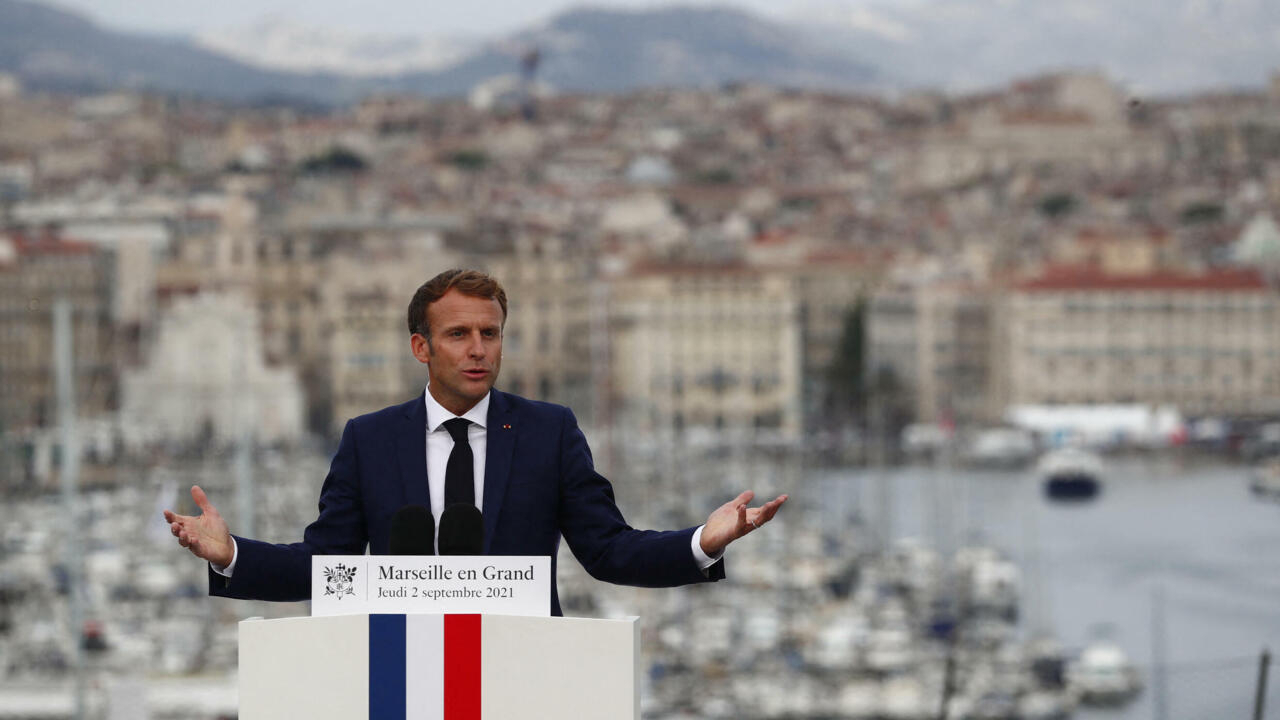
Wednesday, September 8, 2021 - 15:00
Netherlands the main hub for cocaine smuggling in Europe: Europol
The Netherlands and Belgium are now the main hubs for cocaine smuggling in Europe, with both countries supplanting Spain as the main entry point for the drug, European police organization Europol said in a report. "The epicenter of the cocaine market in Europe has moved north," Europol said, AD reports (in Dutch).
Criminal organizations are taking advantage of the increased supply of cocaine and they're increasingly making use of containerized goods transport to bring the drug to the Netherlands through the ports of Rotterdam, Hamburg in Germany, and Antwerp in Belgium. The capacity of these major ports, and their vicinity to the Netherlands, "consolidated the role of the Netherlands as a transit zone." From the Netherlands, the drugs are transported all over Europe, according to the report.
The European cocaine market is doing well due to the growing supply of the drug. Europol attributed this to the "fragmentation of the criminal landscape in source countries". The peace agreement between the Marxist FARC guerrilla movement and the government in Colombia was specifically mentioned. Since this peace agreement, several groups emerged that are fighting for control of cocaine production in the country, the report said. European criminal organizations formed alliances with rival groups in Colombia, resulting in them no longer needing an intermediary and buying their cocaine direct from the source.
Cocaine is the second most used drug in Western- and Central Europe with an estimated 4.4 million users last year. Only cannabis had more users.
Antwerp and Rotterdam are new epicentre of European cocaine trade
September 9, 2021
The increased use of shipping containers to conceal drugs has made the high volume ports of Antwerp, Rotterdam and Hamburg the new epicentre of the European cocaine market, according to a new report on the industry by European police organisation Europol.
This means Europe’s North Sea coast has now overtaken the Iberian peninsula as the primary point of entry for cocaine reaching Europe, Europol says.
While Antwerp is the biggest arrival port for cocaine, most of the drug is ‘is likely intended for organisations operating out of the Netherlands, from where the cocaine is further distributed to other European destinations, Europol said.
At the same time, the booming cocaine market has led to an increase in murder, shootings, bombings, arson, kidnappings, torture and intimidation related to the trade in cocaine, Europol said.
The Netherlands is the ideal environment for the international drugs trade
In order to combat the trade, European countries need to do more to tackle production at source, share information and target corruption at ports, without which, Europol says, many illicit shipments could not happen.
In addition, the authorities should make sure that whistleblower mechanisms and anonymous reporting channels are in place and functioning adequately.
Seizures
Dutch customs officers impounded some 48,000 kilos of cocaine in the ports and at Schiphol airport last year, a rise of 24% compared to 2019.
Seizures at labs are also going up. Last July, police busted the biggest cocaine laboratory ever found in the Netherlands, arresting 17 men, including 13 Colombians, in the process.
The location in Nijeveen, a former stable complex fitted with sleeping quarters and recreational facilities, was used for extracting cocaine from impregnated material, such as clothing. Police found tens of thousands of litres of chemicals and some 100 kilos of cocaine base.
In May, Dutch justice minister Ferd Grapperhaus said he was allocating a further €5m to tackle crime at Rotterdam port.
Major concerns about boom in 'coke collectors' in Rotterdam port
John van den Heuvel and Mick van Wely - 1 hour ago
The port of Rotterdam is plagued by criminals who enter the premises to extract cocaine from containers. Within ten days, more than 110 so-called "haul-outs" have been apprehended. The intensity is unprecedented and is linked to a huge increase in smuggling.
This is reported by investigative sources in the port and confirmed by the Rotterdam police. In the night from Saturday to Sunday alone, customs and police picked 25 sneakers from the port area. One collector had even been apprehended four times before. A truck driver was also caught this weekend for involvement in the smuggling of coke.
On Monday, a bizarre situation arose when nine sneakers in a container on the port site called the emergency number 112 because they were about to suffocate. The men were then freed by emergency services [and arrested].
Criminal organizations that smuggle large consignments of cocaine through the port of Rotterdam or Antwerp send collectors onto the port site to remove the drugs from the containers before they are scanned. The traffickers enter the port in a variety of ways: through purchased access passes, by forcing fences, hidden in cars or trucks or even disguised as an investigating officer. For example, a few years ago a replica customs truck was discovered on the premises.
Trojan Horse
With the growing size of the cocaine consignments intercepted at the port, the massiveness and brutality with which the haulers penetrate the port area is also increasing. Jan Janse, chief of the Seaport Police: "There is a method that we call the Trojan Horse. A truck with a container full of sneak-ins is driven onto the premises. The documentation states that there is a regular load in the container."
The driver then sets down the container full of collectors near a container containing cocaine. "The Trojan horse does have to be put down on the ground, otherwise the intruders cannot get out. It is only thanks to corrupt individuals at transport companies and port companies that this kind of action is possible," Janse explains.
'Hotel container'
Once on the premises, the removers use a 'hotel container', as investigative agencies call them. These are empty containers in which the traffickers stay until they can approach the containers with drugs. Hotel containers of this type are regularly discovered, in which food and drink, sleeping bags and sometimes packing material or duffel bags for coke smuggling are found.
The boss of the Seaport Police Jan Janse first warned of this new phenomenon in De Telegraaf [newspaper] at the end of March last year. At the time, a record number of intruders had been caught, namely almost sixty in three months. Now there are 110 in ten days. By comparison, in all of 2020, 152 suspects were caught on the port grounds for 281 snatchings.
The haulers provide customs and police with a lot of work. Janse: "The checking, arresting and remanding takes a lot of time and there is no time at all for further investigation to find out who the errand boys are working for. It exceeds our manpower. The frustrating thing is also that we know that there are containers full of cocaine somewhere on the premises, but we don't know exactly where. We're very concerned about the current boom in entrants."
Criminal antecedents
The haul-outs are almost all individuals with criminal antecedents. "Often for violence or for drugs. The worrying thing is that criminal organizations apparently have inexhaustible resources for recruiting these kinds of people. Because they just keep coming." Usually there is a ringleader who is experienced and knows the terrain well. A team of seven haulers can remove about 350 kilos of coke from a container at a time. Janse: "And the coke is packed in bags ready for the collectors."
The port of Rotterdam is awash with cocaine. This year, according to police statistics, more than 43,000 kilos have already been intercepted. That's already more than in all of 2020. "We are seeing more and more large batches. From seven hundred to a few thousand kilos," says Janse. In July and August alone, 20,000 kilos were seized. And just in these months there was also a spike in violence in Rotterdam with buildings being fired upon and shootings between individuals. "Arguments almost always arise when drugs are intercepted. It is striking now that the large seizures coincide with violence."
The police also see Dutch traffickers turning up in Antwerp and Hamburg. On Thursday, representatives of Belgian and German customs and police, and representatives of the ports in Rotterdam, Antwerp and Hamburg met to discuss the smuggling problem. They want to put up more barriers to combat smuggling.
Translated with www.DeepL.com/Translator (free version)
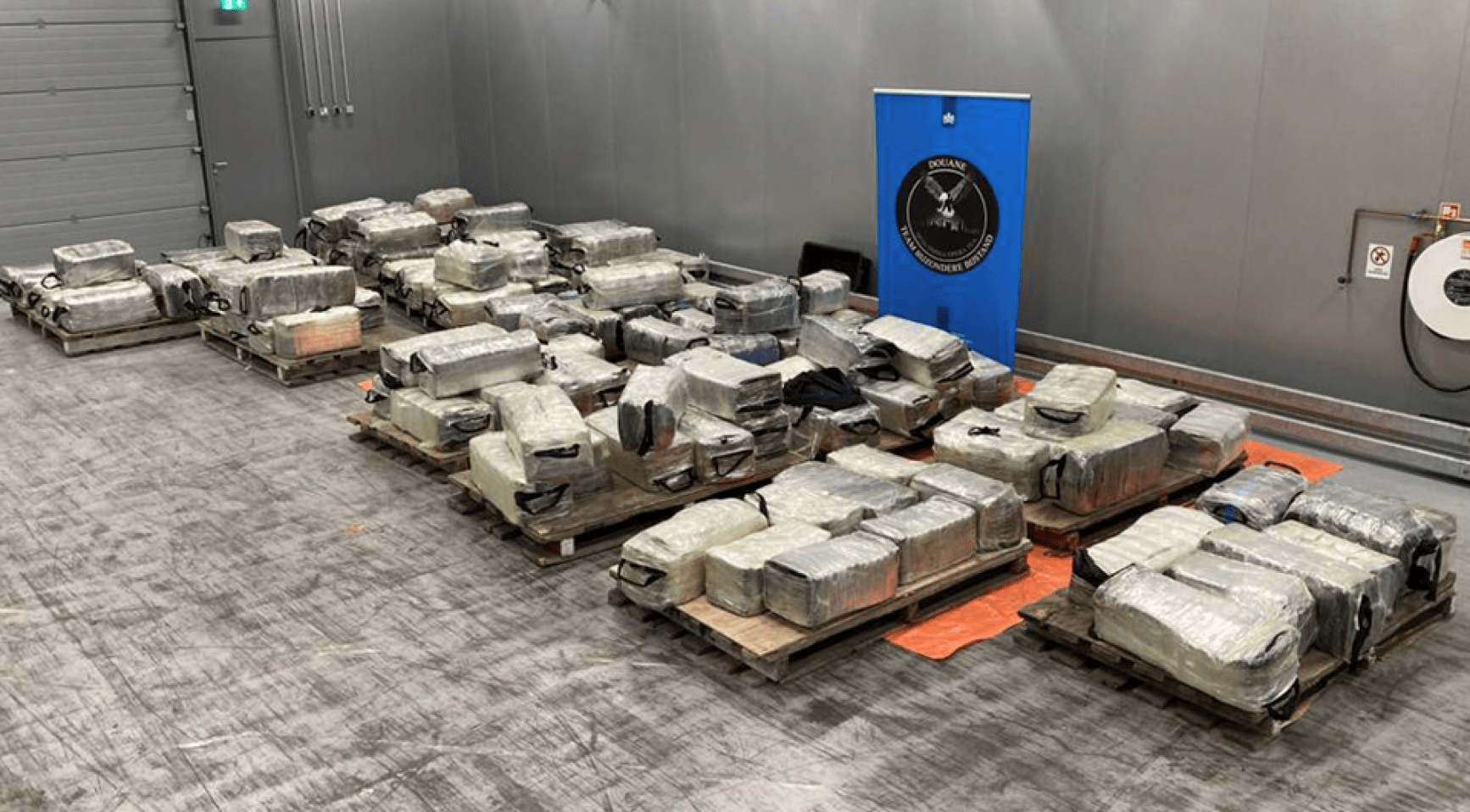
Over 4,000 kilograms of cocaine was discovered at the Port of Rotterdam. 17 Sept. 2021 - Source: Openbaar Ministerie Rotterdam at OM
Saturday, September 18, 2021 - 07:45
Over €300 million in cocaine found in sea container from Suriname
A team of Customs investigators found 4,022 kilograms of cocaine hidden in a shipment of wood that originated in Suriname. The drugs were valued at 301 million euros, the Public Prosecution Service (OM) said.
The discovery was made at the Port of Rotterdam between Thursday night and Friday morning. The sea container with the shipment was destined for a business in Poland. The drugs were destroyed, the OM said. No arrests were announced.
It was the latest in a string of large cocaine seizures at the Rotterdam port. Nearly 11,000 kilograms of the drug was found at the port just in July. An increasing number of people sneaking on to port property to recover hidden drugs have also been detained by police. In August, Europol called The Netherlands and Belgium the main hubs for smuggling cocaine into Europe.
The Hit-and-Run Cargo team is investigating the latest case. The team is made up of Customs officials, and representatives from financial crimes inspectorate FIOD, the port police, and the Rotterdam office of the OM.
Extractors
Even 14-year-olds smuggle coke out of port: 'Reward of 30,000 euros'
Wouter van Dijke - 1 hour 21 minutes ago
Dozens of people have been arrested in the port of Rotterdam in recent days, who may be part of drug smuggling through that port. Even a 14-year-old boy was arrested. Why do these young people do this, and how do they proceed? "The police don't have a stick to beat them with."
The Netherlands is a major transit port for illegal drugs. Thousands of kilos of cocaine enter our country through the port of Rotterdam. Last week another gigaload was intercepted, of over 4,000 kilos.
The drugs found are probably a fraction of all cocaine entering the port in containers. In this smuggling, "extractors" play an important role. Drugs are often hidden in containers with other goods. A trafficker is told which container to go to, breaks it open and smuggles the drugs out of the port.
Status and quick money
In the past two weeks, more than 100 possible traffickers have been arrested in the port of Rotterdam, says the Public Prosecutor's Office (OM). These are young men, sometimes even minors. The youngest was only 14. What drives these guys?
According to Marijn Landsman of Domstad Lawyers, who handles many drug cases, people are recruited specifically for hauling-out. "They are lured with the idea of making a lot of money quickly. They pay handsomely for extracting: it can be a hit of 15,000 to 30,000 euros. Or a trafficker gets to keep part of the drugs for himself."
Fine of 95 euros
Moreover, the peddlers run little risk. Landsman: "If young people are found on the port site, but they are not carrying drugs, the police have no stick to beat them with. Then they can usually only get a fine for being on that site illegally."
This leads to great frustration on the part of the prosecution. "Someone can then only get a fine, of 95 euros," says a spokesperson. "If you compare that to what they would get for a batch of cocaine, they laugh at us."
And so the traffickers go further and further to get drugs off the premises. According to the OM, "hotel containers" have often been used lately. These are empty containers, into which traffickers put mattresses, food and other necessities to last for days if necessary.
In this way they hide for days on the port site, until they are told that a container with drugs is ready. This does not always go well: last week, 9 hiders raised the alarm when they nearly suffocated after running out of oxygen in their container.
A new bill, currently before the Senate, should make it easier to crack down on traffickers. Under the new law, someone who is in the port illegally can already be sentenced to a maximum of one year in prison. In the case of aggravating circumstances, such as working in a group, that maximum can even rise to two years.
"We want that law to come urgently," says the prosecutor's spokesman. "That will make the burden of proof much lower. We then want to start applying the fast-track law: if you're caught, you'll be in court within three days, and you'll be detained for a longer period of time."
__________________________________________________________________________________
Difficult to address
It is now difficult to tackle a trafficker in court. Only if it can be proven that a suspect was engaged in drug smuggling can someone be put in jail. For example, earlier this year, extractors were convicted for carrying a phone with a container number. Four sports bags were found to be hidden in that container, containing over 100 kilos of cocaine.
In another case, people were convicted of using a crane to bring two traffickers on board a container ship. The haul-outs were caught by the ship's crew near the container. It turned out that it contained 98 kilos of cocaine.
___________________________________________________________________________________
According to Landsman, the new law may deter some young people. "But there are still plenty of others who are willing to take the risk. Quite apart from people who are addicted or have a mental illness that can be abused."
'Drug world totally intertwined in port'
"As long as there is big money to be made in drug smuggling, crime will continue," Landsman thinks. Moreover, the haul-outs are only a small link in the global chain of drug smuggling. "It's the smallest guys who are in on it. The people above them stay out of the picture. They're not going to run the risk of hauling-out."
And those errand boys are not the only problem in the port of Rotterdam. The information that the traffickers need often comes from corrupt port employees or customs officers, the OM says.
The rot runs deep, says lawyer Landsman. "Corruption within the port and customs play a big role. Fake entry passes are made, cameras are turned away by security guards, containers are marked. The drug world is totally intertwined in the port."
Translated with www.DeepL.com/Translator (free version)
Six arrested in Breda in major investigation into drugs labs
September 28, 2021
Police have arrested six people after a raid on a trailer park in Breda in connection with a major investigation into drugs-related crime. Several homes and business premises were also searched in the raids, which involved 250 police officers and other officials.
Police say they suspect the gang of setting up at least one drugs lab. The five men and one woman arrested were aged between 28 and 60.
‘The homes and business premises were searched not only for evidence but also for valuables bought with the criminal cash,’ police said in a statement.
The investigation into the gang started last year and in February, the probe led to four people being arrested at a methamphetamine lab in Zeeland. Three of them were Colombian nationals.
Last year, Dutch police closed down 32 meth labs, more than three times the 2019 total.
Thursday, September 30, 2021 - 15:19
Another 100 million euro cocaine bust made at the Rotterdam port
A shipment of cocaine worth over a hundred million euros was discovered at the Rotterdam port on Wednesday night. Customs officials found 1,400 kilograms of the drug hidden in a sea container loaded with cocoa.
The shipment originated in Colombia. "The cargo was destined for a company in France," said the Rotterdam office of the Public Prosecution Service (OM).
The cocaine had a street value of over 105 million euros, the OM stated. The drugs were destroyed by the time the OM disclosed the find late Thursday morning.
One of the largest-ever cocaine seizures at the Rotterdam port was found just 12 days ago in a shipment of wood sent from Suriname. Authorities found over 4,000 kilograms of the drug, which they valued at about 301 million euros. Nearly 11,000 kilograms of the drug was found at the port just in July.
Europol said in August that The Netherlands, along with Belgium, has become a primary hub for smuggling cocaine into Europe. Police have increasingly found criminal suspects sneaking on to port property to recover drugs hidden in various consignments.
Femke Halsema, the mayor of Amsterdam, advocated targetting those who facilitate drug trafficking, and not just intercepting drug shipments. "We always put a lot of focus on the kilograms and the tough guys, but behind them are networks involving serious criminals, who are often backed by a network of accountants, real estate agents, middlemen and, sometimes, also lawyers," she said on Nieuwsuur earlier in September.
In a debate about the Cabinet's budget proposals, Prime Minister Mark Rutte said casual users of illegal drugs are also part of the problem by creating the demand for a billions-euro market controlled by the criminal underworld. To tackle organized crime, the current Cabinet will increase the annual budget of the Ministry of Justice and Security by 434 million euros, with an extra 90 million euro boost on top of that just for 2022.
Sunday, October 3, 2021 - 14:55
€78 million in cocaine found at the Rotterdam port; Nine arrested in separate smuggling case
Custom officials confiscated 1,040 kilos of cocaine with a street value of around 78 million euros in the port of Rotterdam.
The cocaine packets were found behind the door of a container. The container was likely used as a temporary hiding spot.
In a separate incident, the HARC-team arrested nine people in Warder on Friday evening for smuggling 85 kilos of cocaine with a street value of around 6 million euros into the country. The HARC-team is a collaboration of customs officials, the port police, public prosecutors in Rotterdam and the Fiscal Intelligence and Investigation Service (FIOD).
The suspects, including six men, two women and one minor, were between the ages of 16 to 56. They came from Rotterdam, Amsterdam and Warder.
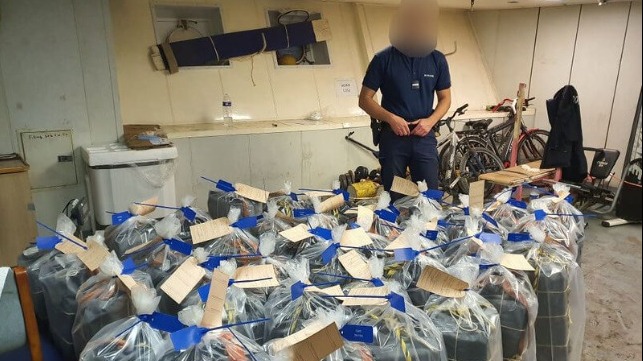
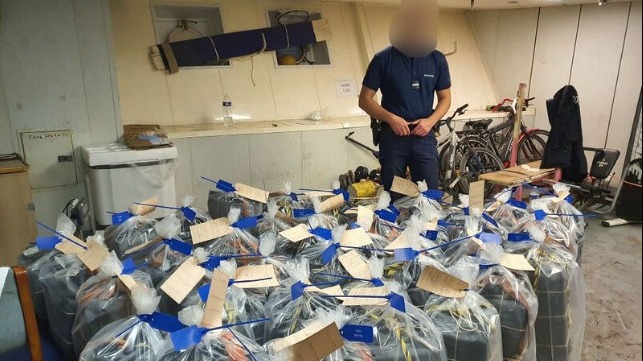
French authorities are reporting a record seizure of more than a ton of cocaine worth tens of millions of dollars from a Liberian registered bulker as it entered the English Channel. It was said to be the largest seizure in French waters since 2018.
In a coordinated effort, French customs authorities assisted by the navy and police intercepted the bulker Trudy near the French port of Dunkirk on October 1. Images show a helicopter hovering above the vessel while patrol boats came alongside and the officers boarded the vessel for an inspection.
The 30,790 dwt bulker was later diverted to the port of Dunkirk for a thorough investigation. The French news agency AFP reports that the authorities have received a tip that led to the interception of the bulker.
The Trudy had departed Brazil in mid-September and made a stop in Las Palmas. She was traveling in French water bound for Antwerp where she was to unload a cargo of chalk.
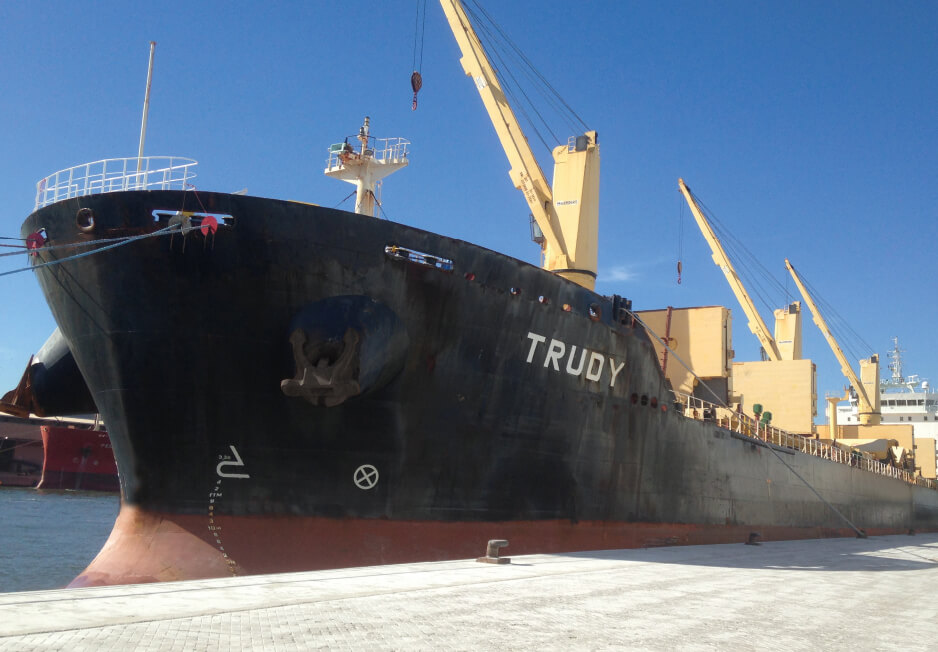
Bulker Trudy was diverted to Dunkirk but has been released while the crew awaits a hearing (file photo)
“After several hours of investigations, the search teams, assisted by a dog handler, discovered, hidden behind a partition, 40 bags containing compact loaves containing a white powder. Anti-narcotics tests have confirmed the presence of cocaine,” announced Olivier Dussopt, Ministre délégué aux Comptes Publics.
The 20 member crew of the Trudy was questioned by the French authorities, and according to reports in the French media, 19 were later indicted on charges related to drug trafficking. One crew member is reportedly assisting the police while 15 have been detained and the other four were placed under supervision. Their nationalities included a Romanian captain as well as Russians, Ukrainians, Filipinos, and Ethiopians. The Russian embassy reports that it has made inquiries into the matter and is looking out for the interests of the Russian seafarers.
“This new cocaine seizure, the most important carried out in French territorial waters in France since 2018, is emblematic of the daily mobilization of customs in the fight against drugs,” said Dussopt. “I would like to salute the active role and the remarkable skills of customs officers in securing flows and protecting citizens, as well as the implementation of various means engaged in the service of State action at sea."
Vessel manager, Columbia Shipmanegement told Lloyds that the bulker has been released and it arranged for a new crew to board the ship. The next court hearing for the crew is scheduled for October 7.
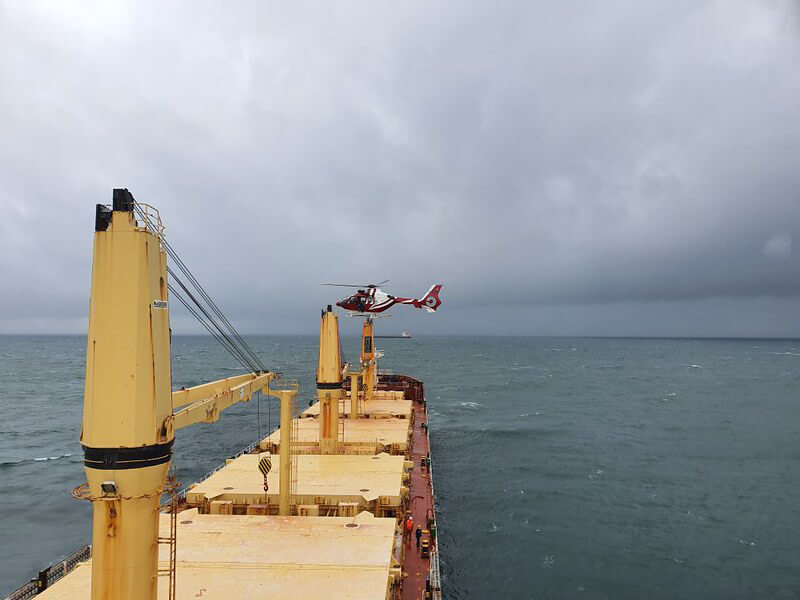
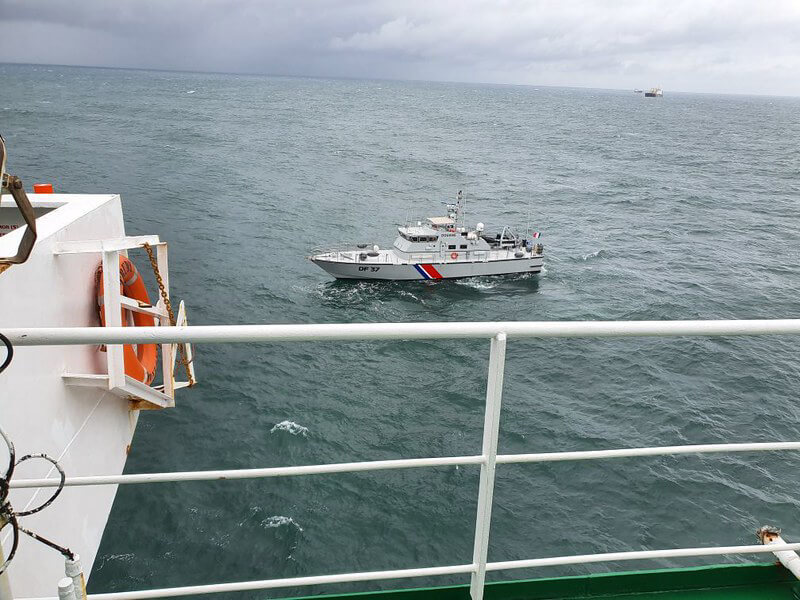
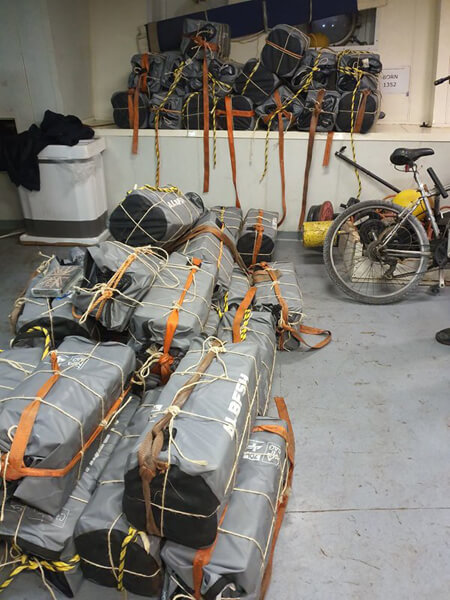
(photos courtesy of Douane Française)
